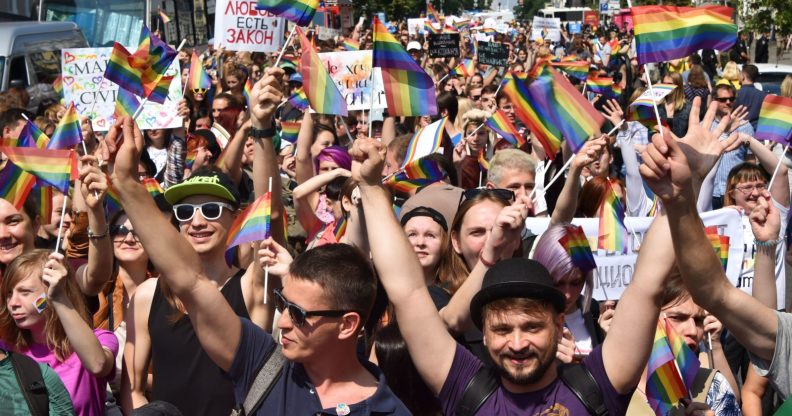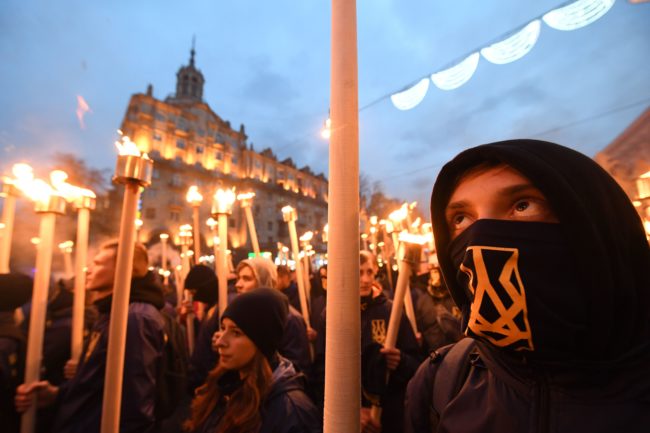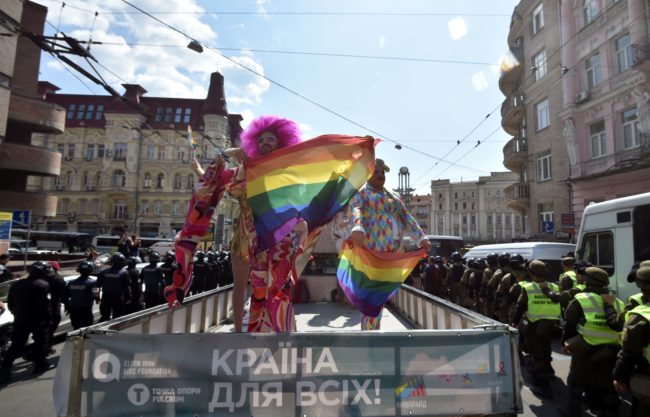Violent far-right nationalists attack LGBT event in Kyiv, police fail to intervene

File photo. Participants wave the gay rights movement’s rainbow flags in central Kyiv during the LGBT Equality march on June 18, 2017 (GENYA SAVILOV/AFP/Getty)
Far-right nationalists have attacked an LGBT event in Kyiv, Ukraine.
The meeting in the Ukrainian capital had been organised by human rights campaigners from Amnesty International, in order to bring together LGBT activists from across the region.
The event, titled The Offensive Against LGBTI Rights as a Form of Censorship: The Russian Experience, was due to be held at a privately-hired venue, Underhub, on May 10.
Representatives from Amnesty International, Human Rights Watch and KyivPride were set to attend as speakers.
However, Amnesty says that more than 20 far-right group members arrived and threatened the participants with violence in order to force the cancellation of the event.

File photo. Ukrainian far-right activists hold torches during a march in central Kyiv on October 14, 2017.
(SERGEI SUPINSKY/AFP/Getty)
Shockingly, five officers from Pechersk District Police who attended the scene allegedly refused to intervene to protect the LGBT activists, while one of the venue’s owners also ordered the LGBT activists to cancel the event and vacate the premises.
The activists were only able to leave safely after further police arrived.
No arrests were made.
Denis Krivosheev, Deputy Director of Amnesty International’s Eastern Europe and Central Asia Regional Office, said: “Given the police’s repeated inaction over such attacks, it is no surprise that members of Ukrainian far-right groups take full advantage of their impunity – repeatedly attacking individuals and groups whose views or identity they dislike.
“For the authorities in Ukraine to tolerate such incidents – many of which have been violent and resulted in injuries – and fail to prosecute the perpetrators shows a shameful disregard for the rights to freedom of expression and peaceful assembly.”

Participants attend Kyiv Pride 2017 in Kyiv. (GENYA SAVILOV/AFP/Getty)
LGBT rights have come to the fore in Ukraine as the country seeks closer ties with the European Union in the wake of its 2014 revolution.
Kyiv hosted the Eurovision Song Contest in 2017, and at the time Mayor of Kyiv Vitali Klitschko told PinkNews that the city was tolerant and welcoming towards LGBT visitors.
The city administration also permits an annual Pride march, Kyiv Pride, which has been allowed to go ahead after long periods of resistance.
However, there has also been a rise in far-right nationalism and anti-LGBT sentiment in the country, with a surge in reported attacks targeted at LGBT events and other minority groups.
Amnesty says that in recent months “there have been at least 30 attacks by members of far-right groups on women rights defenders, LGBTI and left-wing activists and Roma families.”
It adds: “In most cases, the perpetrators act openly and with near-total impunity, often boasting about the incidents on social media.
“In just one case, an attack on the Festival of Equality in the city of Zaporizhzhya in September 2017, the perpetrators were arrested and put on trial.”

Last year, Kyiv’s Friendship of Nations Arch, which was originally dedicated to the unification of Ukraine and Russia within the Soviet Union, was partly repainted in rainbow colours to “celebrate diversity.”
However, the top of the monument was left unpainted after protests from anti-LGBT groups who claimed it was “perverted symbolism.”
Following the protests the remainder of the painting was called off, and Mayor Klitschko declared that as part of a “compromise” the unpainted part of the arch would remain rainbow-free.

